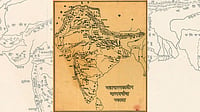If God’s Little Soldier isn’t about terrorism, what is it about? A lot of things: growing up in middle-class Bombay, a dysfunctional liberal Muslim family, the magic of numbers, the certitudes of faith, the unreliability of love, the incertitudes of the stockmarket, psychotic depression, life in a Trappist monastery, extremism, the anti-abortion movement in America, arms-dealing, the Bhakti poet Kabir. And if there’s one thing that ties all these disparate strands together, it’s one man’s quest for the meaning of life.
That man is Zia Khan, introduced to us as a child in the arms of his fundamentalist Muslim aunt Zubeida (who, in one of the paradoxes Nagarkar delights in, has left her husband to nurse an impossible devotion to the actor Dilip Kumar). Zia is the spoilt son of rich parents, precociously self-aware, resentful of his asthmatic brother Amanat, who gets all his mother’s attention, and madly in love with the Bollywood child-star Sagari. His childhood occupies a wonderful first section of the novel, a beginning so compelling that it alone is worth the price of admission. If the rest of the novel doesn’t live up to the promise of the first ninety pages, it’s only because Nagarkar—as that list of his key plot elements suggests—tries to do too much.
Zia goes to a fancy boarding school, turns out to be a mathematical genius, discovers the joys of Islamic self-flagellation, impregnates his best friend’s girl, gets sent to Cambridge, loses interest in mathematics and takes up garbage collection, gets serious about economics, has an affair with a British girl he converts to Islam, decides to assassinate Salman Rushdie, disowns his adulterous mother, nearly murders his own brother, converts to Catholicism and becomes a monk...we’re out of breath already, and we aren’t at the book’s halfway mark yet. Nagarkar is a born story-teller, with a gift for the narrative yarn and an endless supply of plot-lines. But they don’t all seem to belong together; as each episode succeeds the next, it becomes less and less convincing that it’s happening to the same character, and people seem to do things for no comprehensible reason other than that the author decided they would. Nagarkar is the omniscient puppeteer, making his cardboard figures dance and fall to his every twitch, but he sacrifices believability at the altar of his inventiveness. After the moving realism of Zia’s childhood, nothing in the novel seems even remotely plausible. Not even the central character, for the depiction of Zia’s profound Islamic faith and his later Christian zealotry completely undermine each other, and the theory that his "real faith is extremism" is itself too pat to be convincing.
But amidst the frustration of the novel’s half-realised potential there are some genuine gems. None is more remarkable than Amanat’s novel about Kabir, several excerpts from which leap out from the page as the work of a brilliant and humane writer (it so transcends the material surrounding it that one wishes Nagarkar had written the rest of that book instead of this one). The letters of the reflective and self-doubting Amanat are also crafted with rare sensibility. And there is no doubting the intelligence and earnestness with which the author examines the issues of faith and doubt. His Kabir puts it simply: "I may have found the true path, if such a thing exists, but the truth, like all of us, has a short life span. Somebody must then find another path, and another truth. And the one will not cancel the other."
But too many of Nagarkar’s literary paths seem inauthentic, flights of fancy rather than leaps of the imagination, and so they do cancel each other out. Yet his achievement is that he has written a big, weighty book about serious themes and made it, for all its flaws, insistently readable. Don’t look into God’s Little Soldier for insights into terrorism; what little there is on the subject is both perfunctory and contrived. Its real wisdom comes from Amanat’s paraphrase of Kabir that Zia will recall at the novel’s climax: "There is only one God and her name is Life. She is the only one worthy of worship."

























